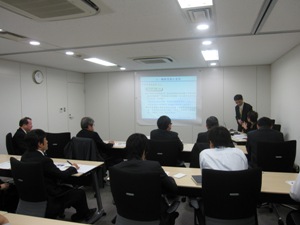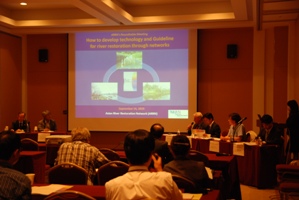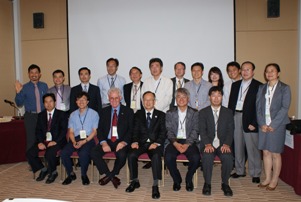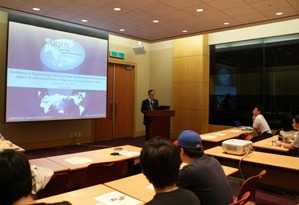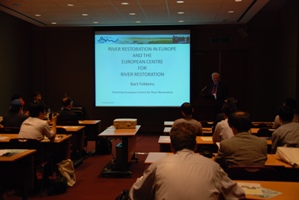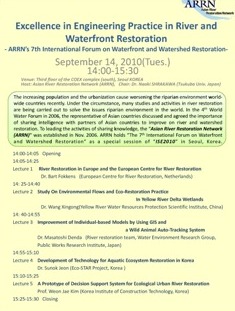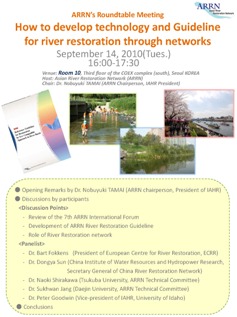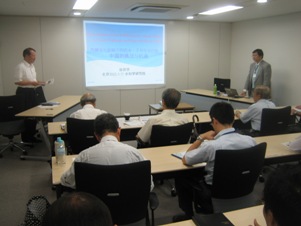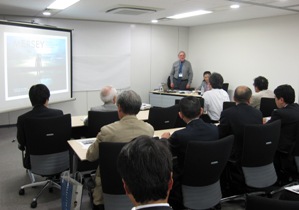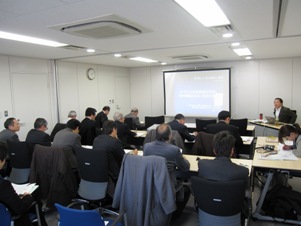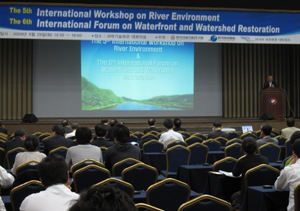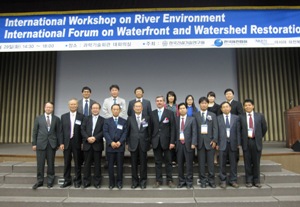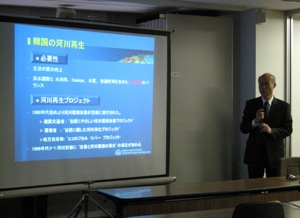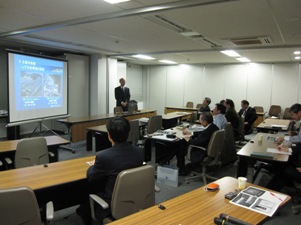
< News and Events Category: JRRN & ARRN's Event Report >
- Mr. Yao Cheng Chuang (Water Resource Agency, Ministry of Economic Affairs, Taiwan)
- Date : December 21, 2010
- Venue : Foundation for Riverfront Improvement and Restoration, JAPAN
- Subject : Rivers in Taiwan - Lessons learned from typhoon disaster experience and flood control measures
The 7th JRRN River Environment Mini Lecture was held on December 21, 2010.
First, the nature of rivers in Taiwan and general water issues, river management systems, etc., were discussed. Next, based on lessons learned from a series of water disasters in the past, a detailed explanation of the concept of river planning and management under extreme weather conditions, and the direction for flood control measures that Taiwan should take in the future, were given together with a presentation of projects in progress.
>>Record of a lecture (Language: Japanese only)
By JRRN-secre | Category: JRRN & ARRN's Event Report | Comment(0) | Trackback(0) |
Date: 2010.12.22 14:09
“The ARRN’s Roundtable Meeting, titled How to develop technology and Guideline for river restoration through networks” was successfully held in Seoul KOREA on 14th Sep. 2010 as the special session of “8th International Symposium on Ecohydraulics 2010”
Date/Time: September 14th 2009 16:00 – 17:30
Venue: COEX complex, Seoul KOREA
Host: Asian River Restoration Network (ARRN),
Chair: Dr. Nobuyuki TAMAI (ARRN Chairperson, IAHR President)
Co-Chair: Dr. BongHee Lee (Secretary General of KRRN)
Discussion Points
- Review of the 7th ARRN International Forum
- Development of ARRN River Restoration Guideline
- Role of River Restoration network
Panelist
- Dr. Bart Fokkens (President of European Centre for River Restoration, ECRR)
- Dr. Dongya Sun (China Institute of Water Resources and Hydropower Research, Secretary General of China River Restoration Network)
- Dr. Naoki Shirakawa (Tsukuba University, ARRN Technical Committee)
- Dr. Sukhwan Jang (Daejin University, ARRN Technical Committee)
By JRRN-secre | Category: JRRN & ARRN's Event Report | Comment(0) | Trackback(0) |
Date: 2010.09.22 17:02
|
Opening speech by Prof. Tamai, ARRN chair
|
|
Presentation by Dr. Bart Fokkens, ECRR president
|
“The 7th International Forum on Waterfront and Watershed Restoration” was successfully held in Seoul KOREA on 14th Sep. 2010 as the special session of “8th International Symposium on Ecohydraulics 2010”
Date/Time: September 14th 2009 14:00 – 15:30
Venue: COEX complex, Seoul KOREA
Host: Asian River Restoration Network (ARRN),
Chair: Dr. Naoki SHRAKAWA (Tsukuba Univ. Japan)
Co-Chair: Dr. Sukhwan JANG (Daejin Univ. Korea)
Program
14:00-14:05 Opening
14:05-14:25
Lecture1 Dr. Bart Fokkens (European Centre for River Restoration, Netherlands)
River Restoration in Europe and the European Centre for River Restoration
14: 25-14:40
Lecture2 Dr. Wang Xingong(Yellow River Water Resources Protection Scientific Institute, China)
Study on Environmental Flows and Eco-restoration Practice in Yellow River Delta
14: 40-14:55
Lecture3 Dr. Masatoshi Denda (River restoration team, Water Environment Research Group, Public Works Research Institute, Japan)
Improvement of Individual-based models by using GIS and a Wild Animal Auto-tracking System
14:55-15:10
Lecture4 Dr. Sunok Jeon (Eco-STAR Project, Korea )
Development of Technology for Aquatic Ecosystem Restoration in Korea
15:10-15:25
Lecture5 Prof. Weon Jae Kim (Korea Institute of Construction Technology, Korea)
A Prototype of Decision Support System for Ecological Urban River Restoration
15:25-15:30 Closing
>>Leaflet(PDF 632KB)
By JRRN-secre | Category: JRRN & ARRN's Event Report | Comment(0) | Trackback(0) |
Date: 2010.09.22 17:01
(1) ARRN’s 7th International Forum on Waterfront and Watershed Restoration
- Excellence in Engineering Practice in River and Waterfront Restoration -
-Time and Date: September 14, 2010(Tues.) 14:00-15:30
-Venue: COEX, Seoul, KOREA
(as a Special Session of International Symposium on Ecohydraulics 2010, ISE2010)
-Host: Asian River Restoration Network (ARRN)
-Chair: Dr. Naoki Shirakawa (Tsukuba University, ARRN Technical Committee)
-Co-Chair: Dr. Bong Hee Lee (Saman Engineering Ltd., KRRN Secretary General)
(2) ARRN’s Roundtable Meeting
- How to develop technology and Guideline for river restoration through networks -
-Time and Date: September 14, 2010(FRI.) 16:00-17:30
-Venue: Room 10, COEX, Seoul, KOREA
(as a Special Session of International Symposium on Ecohydraulics 2010, ISE2010)
-Host: Asian River Restoration Network (ARRN)
-Chair: Dr. Nobuyuki Tamai (Kanazawa Gakuin University, ARRN Chairperson, President of IAHR)
-Co-Chair: Dr. Bong Hee Lee (Saman Engineering Ltd., KRRN Secretary General)
Leaflet: http://www.a-rr.net/news/docs/7thARRNforum_leaflet.pdf
By JRRN-secre | Category: JRRN & ARRN's Event Report | Comment(0) | Trackback(0) |
Date: 2010.09.10 17:36
- Prof. Xu Zongxue (Professor at Beijing Normal University/Deputy Dean, College of Water Sciences)
- Date : September 8, 2010
- Venue : Foundation for Riverfront Improvement and Restoration, JAPAN
- Subject : China’s challenge: against flood, drought and water pollution under climate change
The 6th JRRN River Environment Mini Lecture was held on Wednesday, September 8, 2010.
First, the lecturer introduced the latest situation of damage caused by floods and droughts in China, using pictures. In addition, he outlined water resource management in China, explained flood and drought control in detail, and measures for water quality; he also explained the future direction and ideas of the Chinese government’s water resource management policy. In the exchange of opinions after the lecture, participants asked questions about measures for water environments, dam control in China, and technological transfer from Japan.
>>Record of a lecture (Language: Japanese only)
By JRRN-secre | Category: JRRN & ARRN's Event Report | Comment(0) | Trackback(0) |
Date: 2010.09.10 13:31
- Mr. Walter Menzies (Chief Executive, Mersey Basin Campaign, U.K)
- Date : March 11, 2010
- Venue : Foundation for Riverfront Improvement and Restoration, JAPAN
- Subject : A partnership approach to catchment wide river restoration: the Mersey Basin Campaign experience, U.K.
"The 5th JRRN River Environment Mini Lecture” was held on the afternoon of Tuesday, May 11, 2010.
The lecture started with historical descriptions of the industrial revolution in Liverpool, Britain where the Mersey runs, to its decline. He described the water deterioration of the Mersey around the 1980s, using pictures from those days. Then, he discussed the Mersey Basin Campaign with three central pillars: economics, society, and restoration of natural environment. He explained its objectives, concept, and strategies in detail, as well as specific activities over the past 25 years and key factors for the success of the campaign.
In a one-hour exchange of opinions after the lecture, the lecturer and participants actively exchanged opinions about the organizational structure and funds for the campaign, future development after the completion of activities, cooperation with citizens and enterprises, and specific examples of various large and small activities.
>>Record of a lecture (Language: Japanese only)
By JRRN-secre | Category: JRRN & ARRN's Event Report | Comment(0) | Trackback(0) |
Date: 2010.07.07 13:27
- Mr. Shozo Yamamichi (Representative Director, National Association for Local Water Environment Groups)
- Date : February 23, 2010
- Venue : Foundation for Riverfront Improvement and Restoration, JAPAN
- Subject : Common points between objectives of river improvement and public participation, river environments and flood control, and disaster prevention
The 4th JRRN River Environment Mini Lecture was held on Tuesday, February 23, 2010.
The lecture started by introducing the history of citizens’ activities in rivers over about 50 years in Japan. It was followed by systematic descriptions of the activities of citizens in rivers and waterfronts, using typical case examples nationwide. After that, based on his experience in rivers for about 35 years, the lecturer talked about the objectives and meaning of public participation in river development (which is the main subject of this lecture), as regards: developing an attachment to the region and improving a sense for avoiding disasters; achievement of a safe and comfortable lifestyle; and developing new public management.
In a one-hour exchange of opinions after the lecture, many questions were posed by civic groups, local officials, and consultants engaged in activities in rivers. The lecturer made a valuable suggestion for creating opportunities both for thorough on-site inspection and discussion (e.g. workshops) as a way to promote mutual understanding between river administrators and citizens.
>>Record of a lecture (Language: Japanese only)
By JRRN-secre | Category: JRRN & ARRN's Event Report | Comment(0) | Trackback(0) |
Date: 2010.02.24 13:23
|
Guest speakers and ARRN members
|
“The 6th International Forum on Waterfront and Watershed Restoration” was successfully held in Seoul KOREA on 29th Sep. 2009 as a joint event of “5th KICT International workshop on River Environment”.
Date/Time: September 29th 2009 15:00 – 18:00
Venue: KOFST International Convention Center, Seoul KOREA
Organizer:
Asian River Restoration Network (ARRN), Korea Institute of Construction Technology (KICT), Korea River Association (KRA)
Program
15:00-15:30
- Opening speech Dr. Samhee Lee (Vice President of KICT)
- Welcome speech Dr. Nobuyuki Tamai (Chairperson of ARRN)
- Welcome speech Dr. Kook Il Kim (President of KRA)
15:30-18:00
- Lecture 1 Dr. Naoki Shirakawa (Tsukuba University, JAPAN)
Flow Regime Restoration in Japan - Past, Present and Future
- Lecture 2 Dr. Dongya Sun (Institute of Water Resources and Hydropower Research, CHINA)
Progress of River Restoration in China
- Lecture 3 Dr. Marco Baumann (Canton Thurgau, SWITZLAND)
River Engineering and Management
- Lecture 4 Dr. Hong Koo Yeo (Korea Institute of Construction Technology, KOREA)
Master Plan for Four River Restoration Project in Korea
>>Leaflet(PDF 275KB)
By ARRN-Secretariat | Category: JRRN & ARRN's Event Report | Comment(0) | Trackback(0) |
Date: 2009.10.01 15:28
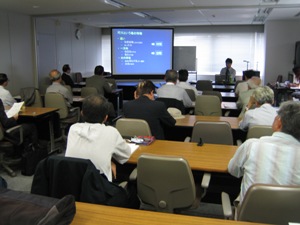
|
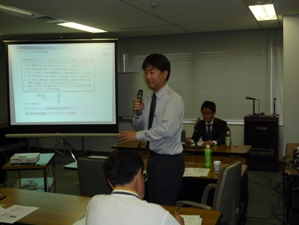
|
- Dr. Naoki Shirakawa (Tsukuba University)
- Date : May 13, 2009, 15:30 - 17:30
- Venue : Foundation for Riverfront Improvement and Restoration, JAPAN
On Wednesday, May 13, 2009, JRRN hosted the Third JRRN Mini-Seminar, the “Endemism of Asia Revealed by Environmental Flows.” ARRN Technical Committee Member Dr. Shirakawa gave a lecture, and the JRRN Secretary explained the “Reference Guideline for Restoration by Eco-Compatible Approach in River Basin ver.1” There was an active exchange of opinions with participants.
Dr. Shirakawa gave a lecture concerning the concept of environmental flow and their setting methods, as well as relations between rivers and civilization in Asia, using the keywords: change and disturbance, and explained the concept that helps to address river environmental restoration. The JRRN Secretariat explained the process involved in the writing of the guideline and its basic ideas, and reported on the collection of case examples of river restoration, which was carried out in parallel with the writing of the guideline.
In an exchange of opinions after the lecture, some asked questions about the definition of the term “environmental flow” and its historical background, while others gave precious opinions concerning the future development of the “Guideline.” The discussion was meaningful for future efforts for river environmental restoration.
→>>Materials (Language: Japanese only)(PDF937kb)
By JRRN-secre | Category: JRRN & ARRN's Event Report | Comment(0) | Trackback(0) |
Date: 2009.07.16 13:22
- Dr. Lee Samhee (Korea Institute of Construction Technology)
- Date : December 10, 2008, 15:30 - 17:30
- Venue : Foundation for Riverfront Improvement and Restoration, JAPAN
On Wednesday, December 10, 2008, JRRN hosted the Second JRRN Mini-seminar on River Environments, “The Restoration of Urban Rivers Including the Anyang River” (with lecturer Dr. Lee Samhee, KICT researcher). The lecture, which was about the current situation of river restoration in Korea as well as technical methods and issues, focused on a case study of the Anyang River. In addition, there was an active exchange of opinions with participants.
In the lecture, Dr. Lee briefly introduced some approaches towards river restoration in Korea. Then, taking up the Anyang River, which is famous as a successful case of urban river restoration, he explained the outline of the restoration project, applied technologies, the current situation of ecological recovery, and participation by citizens.
There was also a one-hour exchange of opinions after the lecture. During that time, participants discussed the differences between characteristics of rivers and the legal systems of Japan and Korea, the importance of the presence of leaders in a project, and relationships among governments, citizens and business organizations in the management of river environments in Korea. This gave a precious opportunity for them to understand similarities and differences between Korea and Japan.
→>>Materials (Language: Japanese only)(PDF 1.5MB)
By JRRN-secre | Category: JRRN & ARRN's Event Report | Comment(0) | Trackback(0) |
Date: 2009.01.16 10:08
<< Previous || Next >>
